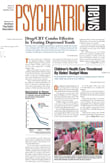The short-term outcome of inpatient treatment for schizophrenia is not dependent on whether the patient is undergoing treatment voluntarily or involuntarily.
The finding provides some empirical evidence to ethically justify involuntary commitment and treatment of patients with schizophrenia from both a legal and a medical perspective, according to a study in the July Psychiatric Services.
Tillman Steinert, M.D., lead author of the report, told Psychiatric News that short-term hospitalization and treatment with neuroleptics for acute symptoms of schizophrenia and delusional disorders is effective“ even if the patient has no positive belief in the treatment and even if he or she is convinced that the treatment is wrong for him or her.”
He added, “We should know as much as possible about the effects of such treatment and about the effects of withholding treatment.”
Steinert is chair of the psychiatric care research department of the Weissenau Psychiatric Center at the University of Uln in Ravensburg, Germany.
The study involved 88 adults patients with schizophrenia and delusions consecutively admitted to a 320-bed psychiatric hospital in southern Germany over a three-month period in 2002. They were assessed using two separate scales at admission and discharge: the Positive and Negative Syndrome Scale (PANSS) and the Global Assessment of Functioning (GAF). Discharge took place an average of 36.2 days after admission.
Patients were grouped according to whether their participation was voluntary or involuntary in each of the five following aspects of inpatient treatment: admission, hospital stay, medication, discharge, and intention to continue treatment after discharge.
Results showed that outcome of treatment—defined as the change between admission and discharge in scores on the PANSS and the GAF, as well as change in those scores per inpatient day—was not significantly related to the voluntariness of patients' participation in any aspect of treatment.
Under German law, medication can be administered by coercion to patients with involuntary legal status during the hospital stay, and patients are so informed by the judge during a commitment hearing.
In the study setting, the classification of a patient's admission, hospital stay, and medication as voluntary or involuntary reflects the patient's legal status and may involve coercion for involuntary patients. However, whether a patient's discharge and intention to continue treatment are classified as voluntary or involuntary reflects the personal choice of the patient and is not subject to formal coercion.
The mean total PANSS score for all patients was 94.1 at admission and 55 at discharge. The mean GAF score for all patients at admission was 34.3.
For all aspects of treatment, no significant difference between the voluntary and involuntary patients was found in the mean change in PANSS score from admission to discharge.
“The involuntary patients generally had improvement that was similar to or even greater than that of the voluntary patients,” according to the paper.
Similarly, no significant difference was found in the increase in GAF score from admission to discharge between voluntary or involuntary patients.
Darrel Regier, M.D., M.P.H., director of APA's Office of Research, who reviewed the report, notes that the sample size in the study was very small—only 13 of the 88 patients were in the involuntary group—but said that its value lies in providing a model for how to subject to scientific scrutiny a subject that arouses considerable passion.
“Opponents of involuntary treatment object on grounds of civil rights, but also because they claim that it always is harmful to the patient,” Regier said. “This is an attempt to scientifically address the question of whether there is always harm associated with coercion when someone is seriously mentally ill.”
The study authors noted that there appear to be no other study findings comparing voluntary and coerced treatment.
“The finding that the outcome of involuntary inpatient treatment is similar to that of voluntary treatment should not lead to underestimation of the subjective suffering of patients who experience involuntary treatment,” the authors wrote, “especially patients with serious disturbances who are repeatedly treated involuntarily.”
Psychiatr Serv 2004 55 786
